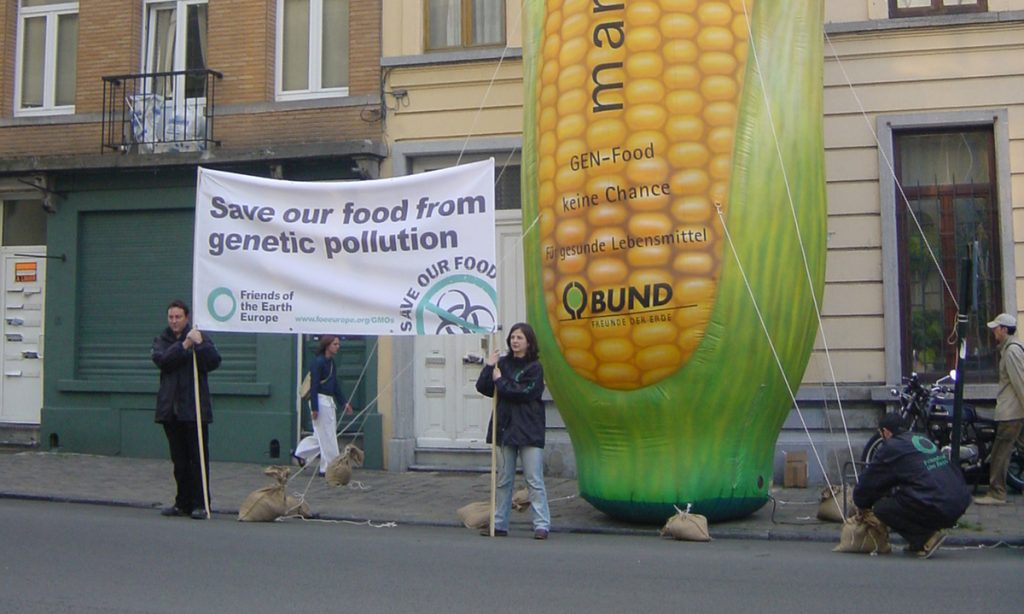Brussels, 14 June 2004 – The twenty five member states of Europe will vote this week for the first time on a Genetically Modified (GM) food. A European Union (EU) regulatory committee will decide on Wednesday 16th June 2004, whether to allow the import of a Monsanto GM oilseed rape, called GT73, that has been modified to resist the company’s own chemical herbicide.
The vote will be seen as a test case for the newly expanded EU following the European Commission’s decision last month to force through the first GM food in over 5 years (1). The result will be closely watched by the US Government who have started a trade dispute in the World Trade Organisation (WTO). US officials have recently stated that “the approval of a single product does not affect our WTO challenge, …[the lifting of the moratorium] does not indicate there is a consistently functioning approval process”. (2)
Although the European Food Safety Authority (ESFA) has given GT73 the all-clear some countries are concerned about its health and environmental safety. Friends of the Earth can reveal that:
1. A Monsanto feeding study on rats that was hidden from the public showed that rats fed the GM oilseed rape had a
15% increase in liver weights. The UK Governments scientific advisors, usually known for their pro-GM stance, have demanded “a satisfactory explanation for this potentially adverse response observed in the rat feeding study…”. (3) In addition the French Commission on Genetic Engineering (Commission du genie biomoléculaire (CGB)) has criticised the design of Monsanto’s feeding trials and highlight that the trials were only conducted during a 28 day period instead of the usual 90 days. (4)
EFSA verdict: increases in liver weight is “incidental” (5)
FOE verdict: further sub-chronic toxicity tests or long term tests necessary.
2. Monsanto has failed to satisfy some member states over the possibility that the imported oilseed rape seeds will escape into the environment (through spillage during transport for example) and create feral populations. The UK authorities have repeatedly called on Monsanto to produce an adequate monitoring plan and an emergency plan should it occur. (3)
EFSA verdict: ports and seed crushing factories usually in industrial areas so “highly unlikely” that the GM plants will cross with conventional oilseed rape.
UK Government: “seed spill is likely to occur and will result in the survival and establishment of feral oilseed rape populations and their hybridisation with crop and other feral populations”.
Geert Ritsema, GMO Coordinator for Friends of the Earth Europe said: “This is an important vote for “New Europe”. Member States have a great opportunity to put the safety of European citizens and their environment before the financial interests of biotech giants like Monsanto and their friends in the White House. Europe should reject this genetically modified crop until it’s safety is proven.”
” This is also another damning piece of evidence against Europe’s food safety authority – EFSA – who have decided to ignore safety concerns and have again sided with Monsanto. For an advisory body that should be acting in the public’s interest this is completely unacceptable.”
NOTES TO EDITORS
1. On 19th May the European Commission approved the import of a GM sweet corn after sufficient Member States failed to support it. This was the first new product authorised in Europe since 1998.
2. Statement by US trade spokesperson Christopher Padilla, New York Times, 15 May 2004, “Europeans Appear Ready To Approve A Biotech Corn”
3. Advisory Committee on Release to the Environment (ACRE),
http://www.defra.gov.uk/environment/acre/advice/pdf/acre_advice36.pdf
4. Le Monde, 23 April 2004







